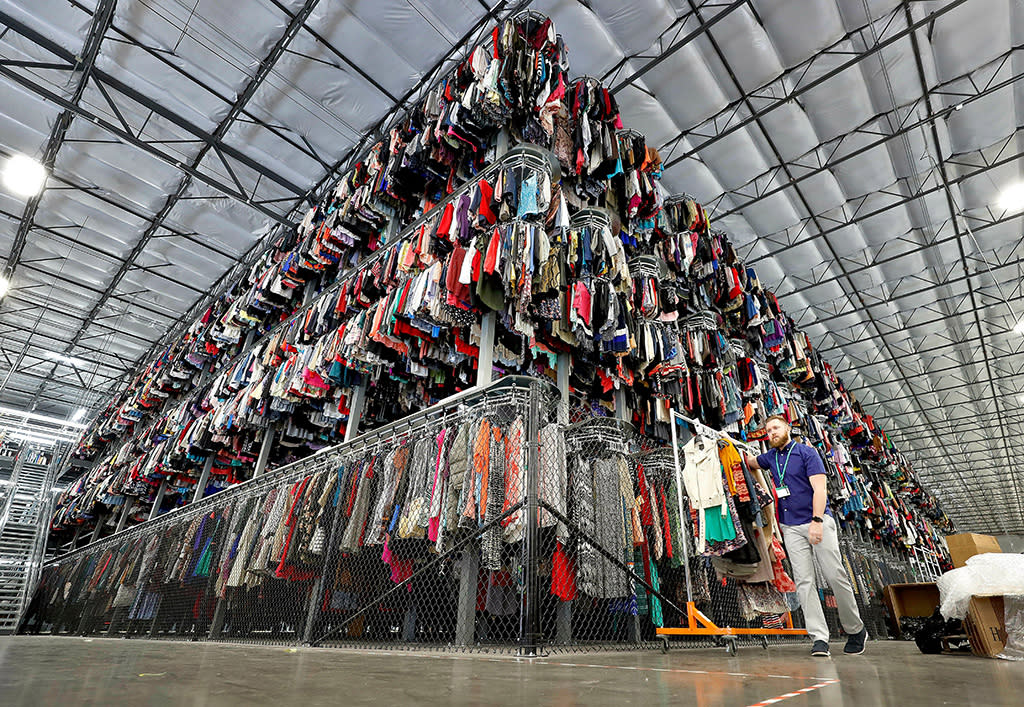The Year of Sharing: Resale and Rental Services Are Changing the Ways We Shop

Click here to read the full article.
Retail is in the midst of a major transformation.
Rapidly changing consumer habits coupled with advancing innovations have led to a decline in traditional brick-and-mortar stores and the rise of digital platforms, as well as a surge in recommerce — the process of selling previously owned, new or used merchandise, which has redefined shopping for today’s generation of customers.
More from Footwear News
Luxury Consignment Site The RealReal Addresses Counterfeit Accusations
How Luxury Brands Could Cash In On the Growing Resale Market
Hire Up: Why Joining StockX Was Deena Bahri's Best Career Decision
According to online thrift shop ThredUp, which conducted research in partnership with retail analytics firm GlobalData, the resale market — worth $24 billion today — is expected to hit $51 billion by 2023, growing 21 times faster than traditional retail over the past three years.
Rental services are also experiencing an uptick: Now valued at $1 billion, the market is forecasted to produce $1.9 billion in sales by the end of 2023, according to consulting firm Allied Market Research.
Among the digital marketplaces that have emerged in the past decade include the aforementioned ThredUp, Poshmark and Depop as well as luxury players like The RealReal and sneaker reseller StockX. Rent the Runway is arguably the first fashion rental platform that comes to mind, but retailers such as Express, Urban Outfitters parent URBN and Bloomingdale’s have also hopped on the “try before you buy” bandwagon. (The subscription services are offered at flat monthly rates and allow shoppers to make a set number of selections from hundreds of brands.)
With more and more customers making the case for high-end goods at more wallet-friendly prices, a number of storied fashion retailers are seeing new opportunities in resale and rental services.
In April, Neiman Marcus took a minority stake in online consignment market Fashionphile, becoming what is widely reported as the first major luxury player to directly invest in resale. In mid-August, Macy’s and JCPenney forged partnerships with ThredUp to host the resaler’s products at its stores. And just last month, fashion rental startup Le Tote closed its acquisition of storied retailer Lord & Taylor, while Nordstrom announced that it had extended its partnership with Rent the Runway to offer rental drop-off boxes in more of its outposts.
“What’s most interesting is the integration of traditional retail and rentals,” said Beth Goldstein, fashion footwear and accessories analyst at The NPD Group. “This will continue — as will expansion into categories such as men’s, accessories and maybe even footwear.”
Highly coveted sneakers have also carved out a major space in resale: Over the summer, StockX reached unicorn status, becoming the first billion-dollar sneaker reseller. And websites like Stadium Goods and GOAT Group have already raised upwards of $200 million in venture capital funding. According to investment bank Cowen, the sneaker and streetwear resale market is forecasted to hit $6 billion by 2025, compared to $2 billion today.
“By thinking outside the box, the resale platforms are finding new ways to entice consumers to buy on their apps with gamification, price-cutting and catering towards the hunters, the thrill-seekers and the ones that find sneaker stores to shop out of the back-stock or basements — these are the collectors,” said Sean Lozano, CEO and founder of sneaker resale platform Laced. “This is why these sneaker resale platforms have a leg up on the brick-and-mortar retailers, and [this] will continue into 2020.”
Beyond the thrill of a deal, resale and rental shopping have an eco-friendly component. The United Nations Environment Programme reports that the fashion industry produces 10% of carbon emissions across the globe as well as 20% of its wastewater. (Without action, the sector is predicted to use up a quarter of the world’s carbon budget by 2050.)
Today’s consumers — particularly millennials and Generation Zers — are known to be more mindful of their consumption. ThredUp’s report noted that 74% of 18- to 29-year-olds prefer to buy from environmentally conscious brands and retailers, adding that buying one used item alone reduces its carbon footprint by 82%.
“The resale market will continue to grow, particularly among Generation Z consumers, as concerns about environmental waste and sustainability remain important issues,” said Kathleen Ruiz, founder and CEO of marketing agency KRW Consulting.
Goldstein added, “Younger consumers don’t feel that they need to own everything.”
While resale still makes up only a small portion of the average American shoppers’ wardrobes, ThredUp expects that 6% share to expand to 13% within 10 years — on track to make up a third of closets by 2033.
“Mass market or luxury, if people can find a high-quality product for much less, they’ll choose used,” wrote cofounder and CEO James Reinhart. “As the line between new and used apparel blurs for consumers, a powerful transformation in retail will unfold.”
Want more?
How Luxury Brands Could Cash In On the Growing Resale Market
Why Brands and Retailers Are So Excited About Rental Services
Best of Footwear News
These Theories About How Black Friday Got Started Will Surprise You
A Look Back at Iconic Department Stores That Went Out of Business
6 Shoe Companies That Have Gone Bankrupt in the Past Year — & How They're Faring Now
Sign up for FN's Newsletter. For the latest news, follow us on Facebook, Twitter, and Instagram.
